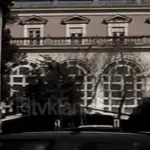 1947 – LSHA, the Association of Writers and Artists of Albania, was founded. LSHA is a non-profit organization created by a group of Albanian writers and artists to propagate the literary and artistic creativity of Albanian authors, to evaluate and re-evaluate the best works of Albanian literature, music, painting and sculpture, traditional and contemporary values, and to encourage the creativity of new talents. Today LSHA has about 1300 members. Its governing bodies are: the National Congress, the Presidency, the President and the Administrative Council. In the organizational structure, the following sections work: literature, music, painting and sculpture, and that of young talents. For more than 60 years of its history, the League of Writers and Artists of Albania has been directed by outstanding personalities of our culture. Its leaders have been the following gentlemen: Sejfulla Maleshova (deceased), Dhimitër Shuteriqi (deceased), Dritëro Agolli (deceased), Bardhyl Londo, Xhevahir Spahiu, Limos Dizdari, Zyhdi Morava (deceased) and Hysen Sinani.
1947 – LSHA, the Association of Writers and Artists of Albania, was founded. LSHA is a non-profit organization created by a group of Albanian writers and artists to propagate the literary and artistic creativity of Albanian authors, to evaluate and re-evaluate the best works of Albanian literature, music, painting and sculpture, traditional and contemporary values, and to encourage the creativity of new talents. Today LSHA has about 1300 members. Its governing bodies are: the National Congress, the Presidency, the President and the Administrative Council. In the organizational structure, the following sections work: literature, music, painting and sculpture, and that of young talents. For more than 60 years of its history, the League of Writers and Artists of Albania has been directed by outstanding personalities of our culture. Its leaders have been the following gentlemen: Sejfulla Maleshova (deceased), Dhimitër Shuteriqi (deceased), Dritëro Agolli (deceased), Bardhyl Londo, Xhevahir Spahiu, Limos Dizdari, Zyhdi Morava (deceased) and Hysen Sinani.
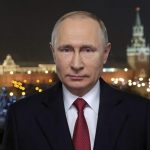 1952 – President of Russia Vladimir Putin was born in Leningrad (Saint Petersburg) of the Soviet Union. Putin will lead the Russian state with authoritarian methods from 2000 onwards. He would previously serve as an officer in the KGB (Soviet intelligence service) in Berlin. Vladimir Putin would intervene militarily in Georgia in 2008 and in Ukraine in 2014, encountering broad opposition in international politics, especially in the West. During his presidency, Russia would experience a political, military, and to some extent economic expansion. On February 24, Putin announced live on television the launch of a “special military operation” in Ukraine, launching a full-scale invasion of Ukraine. He said the purpose of the “operation” was to “protect the people” in the mainly Russian-speaking region of Donbass, which, according to Putin, “for eight years now, has been facing humiliation and genocide committed by the Kiev regime.” Putin also went on to say that “all responsibility for a possible bloodshed will be entirely on the conscience of the regime ruling on the territory of Ukraine.
1952 – President of Russia Vladimir Putin was born in Leningrad (Saint Petersburg) of the Soviet Union. Putin will lead the Russian state with authoritarian methods from 2000 onwards. He would previously serve as an officer in the KGB (Soviet intelligence service) in Berlin. Vladimir Putin would intervene militarily in Georgia in 2008 and in Ukraine in 2014, encountering broad opposition in international politics, especially in the West. During his presidency, Russia would experience a political, military, and to some extent economic expansion. On February 24, Putin announced live on television the launch of a “special military operation” in Ukraine, launching a full-scale invasion of Ukraine. He said the purpose of the “operation” was to “protect the people” in the mainly Russian-speaking region of Donbass, which, according to Putin, “for eight years now, has been facing humiliation and genocide committed by the Kiev regime.” Putin also went on to say that “all responsibility for a possible bloodshed will be entirely on the conscience of the regime ruling on the territory of Ukraine.
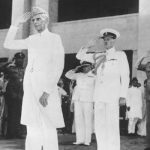 1958 – A coup d’état orchestrated by military troops commanded by General Ayub Khan takes place in Pakistan and overthrows the government of Feroze Khan. At the same time, martial law was declared, where the population was subjected to state-encirclement. This coup was aimed at strengthening the power of President Iskander Mirza. Then everything would go back to normal. What is worth noting is that the coup d’état in Pakistan is among the rare ones in the world where no casualties were recorded.
1958 – A coup d’état orchestrated by military troops commanded by General Ayub Khan takes place in Pakistan and overthrows the government of Feroze Khan. At the same time, martial law was declared, where the population was subjected to state-encirclement. This coup was aimed at strengthening the power of President Iskander Mirza. Then everything would go back to normal. What is worth noting is that the coup d’état in Pakistan is among the rare ones in the world where no casualties were recorded.
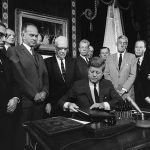 1963 – The President of the United States of America, John Kennedy, ratified the Treaty on the Prohibition of Nuclear Weapons. 126 UN countries have signed this treaty while 70 others have refused to sign it. One of these countries is the Republic of China, which has developed its nuclear program in the last 50 years. This agreement aims that in the future all countries participating in the UN, will not test any nuclear weapons, thus maintaining peace and security around the world.
1963 – The President of the United States of America, John Kennedy, ratified the Treaty on the Prohibition of Nuclear Weapons. 126 UN countries have signed this treaty while 70 others have refused to sign it. One of these countries is the Republic of China, which has developed its nuclear program in the last 50 years. This agreement aims that in the future all countries participating in the UN, will not test any nuclear weapons, thus maintaining peace and security around the world.
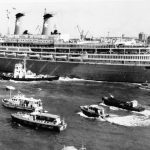 1985 – Four armed terrorists, members of the OCP, take hostage the Italian cruise ship MS Achille Lauro During this hostage-taking, an American citizen of Israeli origin was killed. After four days of negotiations between the terrorists and the Italian government, the cruise ship Achille Lauro headed for Port Said in Egypt with the hostages. Then, according to the agreement between the official Rome and the Palestinians, the release of 50 of them from Israeli prisons was achieved. While all the hostage takers can escape with Yugoslav passports in the direction of Tunisia.
1985 – Four armed terrorists, members of the OCP, take hostage the Italian cruise ship MS Achille Lauro During this hostage-taking, an American citizen of Israeli origin was killed. After four days of negotiations between the terrorists and the Italian government, the cruise ship Achille Lauro headed for Port Said in Egypt with the hostages. Then, according to the agreement between the official Rome and the Palestinians, the release of 50 of them from Israeli prisons was achieved. While all the hostage takers can escape with Yugoslav passports in the direction of Tunisia.
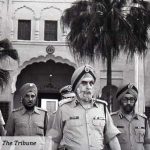 1987 – Sikh nationalists in Northern India declare the independence of the Khalistan region. But this independence was not recognized by any country in the world. The separatist movement of the Sikhs in India and then in Pakistan would create a climate of political and ethnic turbulence in these countries. And this after this minority claims to create a state in the part of the Himalayan ranges. Official New Delhi has often acted militarily against them, moving them across its state border.
1987 – Sikh nationalists in Northern India declare the independence of the Khalistan region. But this independence was not recognized by any country in the world. The separatist movement of the Sikhs in India and then in Pakistan would create a climate of political and ethnic turbulence in these countries. And this after this minority claims to create a state in the part of the Himalayan ranges. Official New Delhi has often acted militarily against them, moving them across its state border.
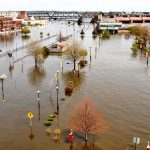 1993 – The famous flood of the Mississippi River in the south of the USA ends after 6 months. The damage from this flood would be calculated at 15 billion dollars, while the victims would be 32. The geographical line of the flood would extend over a space of 1200 km horizontally and 700 km vertically. The flooded land surface would be 830 thousand square km, while another 80 thousand km were severely damaged. This would be one of the worst floods in the region since 1927.
1993 – The famous flood of the Mississippi River in the south of the USA ends after 6 months. The damage from this flood would be calculated at 15 billion dollars, while the victims would be 32. The geographical line of the flood would extend over a space of 1200 km horizontally and 700 km vertically. The flooded land surface would be 830 thousand square km, while another 80 thousand km were severely damaged. This would be one of the worst floods in the region since 1927.
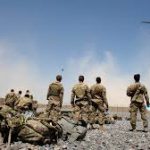 2001 – The military intervention of the United States of America against the Taliban regime in Afghanistan officially begins. After the terrorist attacks of September 11, the administration of George W. Bush, with the unanimous decision of the Senate, decided to intervene in this country to destroy the Taliban regime. At the same time, the American invasion of Afghanistan would bring about the beginning of a fierce asymmetric war between the forces of the Western coalition and the terrorist cells of Al Qaeda. This conflict continues to be present today.
2001 – The military intervention of the United States of America against the Taliban regime in Afghanistan officially begins. After the terrorist attacks of September 11, the administration of George W. Bush, with the unanimous decision of the Senate, decided to intervene in this country to destroy the Taliban regime. At the same time, the American invasion of Afghanistan would bring about the beginning of a fierce asymmetric war between the forces of the Western coalition and the terrorist cells of Al Qaeda. This conflict continues to be present today.
 2006 – Russian journalist, writer, and activist Anna Politkovskaya dies at the age of 48 in Moscow. She was shot dead in the elevator of her apartment by unknown assailants. Politkovskaya would become known for her harsh criticism of Russian President Vladimir Putin. She would closely observe the Russian-Chechen conflict and the one in Transcaucasia. Politkovskaya’s death would correspond to Putin’s birthday in Moscow. Many Russian and Western analysts accused the official Kremlin of being behind her elimination.
2006 – Russian journalist, writer, and activist Anna Politkovskaya dies at the age of 48 in Moscow. She was shot dead in the elevator of her apartment by unknown assailants. Politkovskaya would become known for her harsh criticism of Russian President Vladimir Putin. She would closely observe the Russian-Chechen conflict and the one in Transcaucasia. Politkovskaya’s death would correspond to Putin’s birthday in Moscow. Many Russian and Western analysts accused the official Kremlin of being behind her elimination.
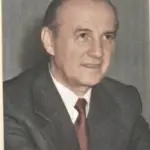 2011– Ramiz Tafë Alia, one of the most important figures of the Labor Party of Albania, who led Albania between 1984 and 1990 and was president of the republic, passed away. Alia is included in the list compiled by the Institute for the Study of Crimes and Consequences of Communism, which summarizes the participants who have direct responsibility for the crimes of the Albanian Communist Party and the National Liberation Army, being, according to law no. 41, members of political and military structures “who have inspired, organized, ordered, executed or assisted partisan forces in criminal acts”. After the death of Enver Hoxha, he was the first secretary of the Central Committee of the Labor Party. In December 1990, the regime faced student protests. Alia met with students and young people and in her New Year’s message to the Albanian people she welcomed the changes taking place in the country. After the first multiparty elections in Albania held on March 31, 1991, the new pluralist parliament dominated by APS deputies, on April 30, 1991, on the proposal of APS, elected Ramiz Ali, President of the Republic. With the fall of the coalition government in December 1992 and the Democratic Party of Albania winning a landslide victory in the spring 1992 general elections, he resigned as president on April 3, 1992. On April 9, the People’s Assembly elected the leader of the DP, Sali Berisha as the new head of the Albanian state. On September 12, 1992 he was placed under house arrest and a year later he was arrested. After suffering from a traffic in the lungs, (pulmonary thromboembolism) he died in the sanatorium hospital of Tirana. With his death, an era closes. He was the last communist president and the first pluralist.
2011– Ramiz Tafë Alia, one of the most important figures of the Labor Party of Albania, who led Albania between 1984 and 1990 and was president of the republic, passed away. Alia is included in the list compiled by the Institute for the Study of Crimes and Consequences of Communism, which summarizes the participants who have direct responsibility for the crimes of the Albanian Communist Party and the National Liberation Army, being, according to law no. 41, members of political and military structures “who have inspired, organized, ordered, executed or assisted partisan forces in criminal acts”. After the death of Enver Hoxha, he was the first secretary of the Central Committee of the Labor Party. In December 1990, the regime faced student protests. Alia met with students and young people and in her New Year’s message to the Albanian people she welcomed the changes taking place in the country. After the first multiparty elections in Albania held on March 31, 1991, the new pluralist parliament dominated by APS deputies, on April 30, 1991, on the proposal of APS, elected Ramiz Ali, President of the Republic. With the fall of the coalition government in December 1992 and the Democratic Party of Albania winning a landslide victory in the spring 1992 general elections, he resigned as president on April 3, 1992. On April 9, the People’s Assembly elected the leader of the DP, Sali Berisha as the new head of the Albanian state. On September 12, 1992 he was placed under house arrest and a year later he was arrested. After suffering from a traffic in the lungs, (pulmonary thromboembolism) he died in the sanatorium hospital of Tirana. With his death, an era closes. He was the last communist president and the first pluralist.






